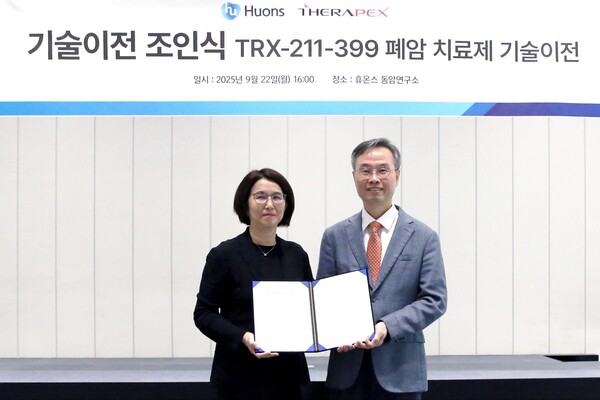Huons has added a non-small cell lung cancer (NSCLC)-targeted anticancer agent to its drug portfolio and begun expanding its drug development pipeline through open innovation.
Huons announced on Tuesday that the company signed an agreement with Therapex to in-license its targeted anticancer drug candidate for NSCLC, TRX-211, on Monday at its Dong-Am Research Center.

According to the agreement, Huons will lead the development of a clinical trial for TRX-211, which is currently in the preclinical phase. Huons will also have the option to acquire global rights in the future.
TRX-211 is an oral tyrosine kinase inhibitor (TKI) targeting epidermal growth factor receptor (EGFR) exon 20 insertion-mutant NSCLC. Therapex presented the preclinical trial results of TRX-211, with its improved efficacy and selectivity, at the American Association for Cancer Research (AACR) Annual Meeting 2024.
Huons said it has decided to in-license TRX-211, hoping that it will provide a new treatment option for patients with EGFR exon 20 insertion-mutant NSCLC who are in great need of alternative treatment options.
“Therapex’s new drug candidate TRX-211 is a cluster of know-hows of Therapex’s EGFR mutant lung cancer therapy,” Therapex CEO Koo Lee said. “Therapex plans to provide a new business model where technology-based biotech grows to become the major commercialization entity by leveraging Huons’ great R&D infrastructure and clinical networks.”
Huons CEO Song Soo-young said, “Having sufficient experience in executing global clinical trials and business, along with its financial capabilities, Huons' collaboration with Therapex on cutting-edge targeted anticancer agent is a great example of open innovation in the field.”
When it comes to developing new drugs, Huons will generate unique synergies through collaborating with a long-term vision and external technologies, Song added.
Lung cancer is divided into small-cell lung cancer (SCLC) and NSCLC based on pathological criteria, such as the size and shape of cancer cells. According to the National Cancer Registry Statistics released by the Ministry of Health and Welfare in 2024, there were 32,313 cases of lung cancer in Korea in 2022, accounting for 11.5 percent of all cancer occurrences. NSCLC accounts for 0- 85 percent of all lung cancer patients.
Related articles
- Huons picked for national project to stabilize orphan and essential drug supply
- Huons Meditech appoints Ha Chang-woo as new CEO
- Huons’ smart insulin pen DIA:CONN P8 improves glycemic control in clinical study
- Huons BioPharma receives the Gender Equality Excellence Award from Jecheon
- Huons Meditech wins CE-MDR approval for digital infusion system
- Huons Global posts record quarterly revenue despite profit decline in Q2
- ‘In EGFR-mutated lung cancer treatment, combo therapy emerges as new standard’
- Huons' Q3 operating profit up 14% on export rebound, CMO growth
- Huons Global's Q3 operating profit jumps 42% as pharma, toxin exports drive growth

